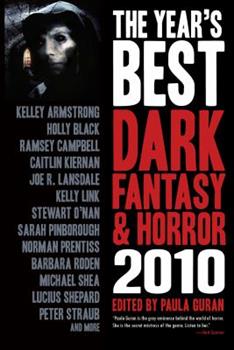What the Hell Do You Mean by “Dark Fantasy and Horror?”
“I shall not today attempt further to define the kinds of material I understand to be embraced within that shorthand description [hard-core pornography]; and perhaps I could never succeed in intelligibly doing so. But I know it when I see it…”
—Justice Potter Stewart, Jacobellis v. Ohio, 378 U.S. 184 (1964)
 Like Justice Stewart with pornography, I can’t intelligibly define “dark fantasy.” But I know it when I read it.
Like Justice Stewart with pornography, I can’t intelligibly define “dark fantasy.” But I know it when I read it.
Of course, you might not agree with what I “see” as dark fantasy. I might not agree with what you “see.”
There’s no single definition. “Dark fantasy” isn’t universally defined—the definition depends on the context in which the phrase is used or who is elucidating it. It has, from time to time, even been considered as nothing more than a marketing term for various types of fiction.
Darkness itself can be many things: nebulous, shadowy, tenebrous, mysterious, paradoxical (and thus illuminating)…
A dark fantasy story might be only a bit unsettling or perhaps somewhat eerie. It might be revelatory or baffling. It can be simply a small glimpse of life seen “through a glass, darkly.” Or, in more literary terms (all of which have debatable) it might be any number of things—as long as the darkness is there: weird fiction (new or old) or supernatural fiction or magical realism or surrealism or the fantastique or the ever-ambiguous horror fiction. And since horror is something we feel—it’s an emotion, an affect—what each of us experiences or responds or reacts to differs.
What you feel may not be what I feel. Maybe you can’t stand the thought of, oh…spiders. Understandably, one doesn’t want to encounter one of the poisonous types, but I think of spiders, for the most part, as helpful arachnids that eat harmful insects. You, however, might shiver at the very thought of eight spindly legs creeping down your wall.
Once upon a time I felt the term “horror” could be broadened, accepted, and generally regarded as a fiction [to quote Douglas E. Winter who wrote in Revelations (1997)] that was “evolving, ever-changing—because it is about our relentless need to confront the unknown, the unknowable, and the emotion we experience while in its thrall.”
One reason Winter was reminding us of that in the introduction to his anthology was because the word “horror” had already been devalued. He was right about what horror literature is, but the word itself had been slapped on a generic marketing category and, by 1997, the word had become a pejorative. The appellation was hijacked even more completely in the years thereafter and became associated in the public hive mind—an amorphous organism far more frequently influenced by the seductive images, motion, sounds, and effects that appear on a screen of any size than by written words (even when they are on a screen)—with entertainments that depend on shock for any value they may (or may not) possess rather than eliciting the more subtle emotion of fear.
And while fine and highly diverse horror literature—some of the best ever created—continues to be written in forms short and long, the masses for the most part have identified “horror” as either a certain kind of cinema or a generic type of fiction (of which they have certain expectations or ignore entirely because it delivers only a specific formula.)
So, the term “horror” has been expropriated, and I doubt we’ll ever be able to convince the world it means what we alleged horror mavens might want it to mean.
We’re back to “What the hell…?” Aren’t we?
I’m not offering any definitions. I’m merely offering you, the reader, a diverse selection of stories—all published within the calendar year 2009—that struck me as fitting the title of this tome. Each of them—no matter the style of the writing, theme, or shade of darkness—grabbed me from the start and kept me reading. You may find yourself abruptly jerked from one reality and thrust into another as you read—I have eclectic tastes. I hope you do, too, or are at least willing to try a taste of something new.
If you are interested in my own shallow musings on the selections, I’ve included comments at the end of each. But don’t read the notes until after you’ve read the story! If you do, well…
You never know what might find you in the dark.
Paula Guran
June 2010